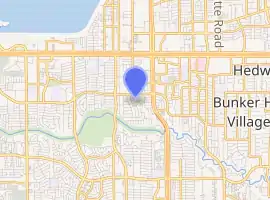Edith L. Moore Nature Sanctuary
The Edith L. Moore Nature Sanctuary is a 17.5-acre (7.1 ha) nature sanctuary along Rummel Creek, located in Houston, Texas, in the United States.[1] Named after Edith Lotz Moore, who lived on the land with her husband for 43 years, the sanctuary includes a restored log cabin[2] for hosting educational programs and houses administrative offices for the Houston Audubon Society. Since 1975, Houston Audubon has preserved Edith Moore's log cabin in addition to developing trails, creating education programs, constructing an office, and performing outreach from the site.[3] The sanctuary also operates a plant nursery that provides wildflowers and grasses for coastal prairie restoration projects or offered for sale to support the Audubon programs.[4] It specializes in local native prairie grasses and wildflowers with a small selection of understory plants.[5] Moore donated land to the Houston Audubon Society in 1975, to be used as a nature preserve for birds. According to the Houston Audubon Society, the sanctuary's mission is to "provide an urban wildlife sanctuary for native plants and animals and to provide education about the natural environment to Houstonians of all ages."[1] Birding programs and day camps held at the sanctuary serve more than ten thousand children and adults every year.[6][7] This trail is accessible from 7am-7pm.
| Edith L. Moore Nature Sanctuary | |
|---|---|
_-_02.JPG.webp) Part of the sanctuary, 2014 | |

| |
| Type | Nature sanctuary |
| Location | Rummel Creek |
| Nearest city | Houston, Texas, U.S. |
| Coordinates | 29.771°N 95.569°W |
| Area | 17.5 acres (7.1 ha) |
| Created | 1975 |
| Operated by | Houston Audubon |
| Open | 7am-7pm |
Moore Log House
_-_25.JPG.webp)
Edith Moore and her husband Jesse were "early environmentalists," never harvesting a tree that was less than 10 inches in diameter.[8] The pine logs used to build the cabin were cut from their land; the chimney and fireplace are built of sandstone curbstones reclaimed from the City of Houston.
Edith Lotz Moore
Edith Moore was born July 12, 1884, in Minnesota. To pay for her education at the University of Minnesota, she sang at weddings. She moved to Houston during World War I to work as a bacteriologist and pathologist at Camp Logan, now known as Memorial Park.[9] When she graduated from the University of Minnesota, she came to Houston during WWI to do her part for the war by working as a bacteriologist and pathologist at Camp Logan, a military installation in what is now Memorial Park. When the war ended, she went to work for the City of Houston as a scientist and married a milk inspector named Jesse Moore.[10]
See also
References
- "Edith L. Moore Nature Sanctuary". Houston Audubon Society. Retrieved November 20, 2016.
- "Log Cabin at Edith L. Moore Nature Sanctuary". Houston Audubon Society. Retrieved November 20, 2016.
- Jackson, Matthew. "GOING WILD IN THE CITY: HOUSTON AUDUBON'S EDITH L. MOORE NATURE SANCTUARY". Retrieved 2 April 2018.
- "Gulf Coast Chapter". TXMN. Texas A&M AgriLife Extension. Retrieved 18 March 2018.
- "Natives Nursery". Bird Friendly Nurseries. Retrieved 2 April 2018.
- Wesolek, Barbara Duvall. "Another Time, Another Place". Texas Escapes. Retrieved 30 March 2018.
- "Edith L. Moore Nature Sanctuary offers summer camp for kids". chron.com. Retrieved 2 April 2018.
- Turner, Allan. "Log cabin in city's heart gets new lease on life". Houston Chronicle. Retrieved 18 March 2018.
- Hester, Joy. "Edith L. Moore - OU007A". Open Caching. Retrieved 2 April 2018.
- Wesolek, Barbara. "Another Time, Another Plae". Retrieved 2 April 2018.
External links
| Wikimedia Commons has media related to Edith L. Moore Nature Sanctuary. |
- Official website, Houston Audubon Society
- Birding and walks
- Field trips
- Maps
- Trail guide
